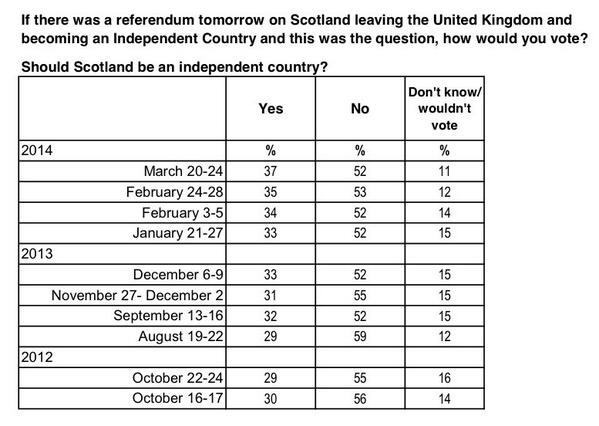There are some pollsters who believe nothing has changed since 2011. All the storm and blast, bluff and bluster about Scottish independence has had no impact at all. The settled will of the Scottish people remains settles: more power for Edinburgh but no to independence. Oddly YouGov’s Peter Kellner is one of these pollsters.
Oddly because, as the chart above shows, his own polling organisation’s reports show that the race is, as long expected, tightening. There is a small but definite drift to Yes. True, at its present rate it will not be enough to prevail come September. But it is quite possible that the drift towards a Yes vote will become stronger, not weaker, as the referendum day approaches.
You would expect it to say so. The Yes campaign enjoys many advantages, after all. It is united. It knows what it wishes to achieve. It can sell a vision for the future. It asks Scots to believe in themselves and most people would, all things being equal, quite like to believe in themselves.
Of course you can take another view: the Yes campaign can and will say anything to win your vote. Facts are for other people and unwelcome reality must not be allowed to penetrate the Yes cocoon. There is a Tartan Money Tree and a Magic Porridge Bowl.
Be that as it may, you can see why some folk in Downing Street are worried. Whatever its faults – and they are legion – the Yes campaign has an easier task projecting an idea of Scotland in 15 years time than does the No side. Unionist hymns to Britannia and identity are all very well and good but they do tend, perhaps unavoidably, to focus on the past rather more than the future. What have you done for me lately, pal?
The SNP’s long, slow rise – remember the party didn’t win an election until 2007 – has changed the nature of the Union. This is so even if Scotland – as still seems probable – votes No in September. It is no longer something to be taken for granted, no longer a constitutional reality beyond question. It is a transactional Union whose legitimacy will rest upon what it does not, as was long the case, upon its simple existence. Again, what have you done for me lately?
This will, understandably, depress some people. But there you go. Too bad.
Again, a No vote remains the more probable outcome but the value bet may now lie with lumping on Yes.
And why not? Our old friend, the Overton Window is in play. This is a long, long, long campaign and the longer it lasts so the more ordinary and acceptable a Yes vote becomes. It ceases to be something of which to be terrified even if it might actually produce something terrifying. Call it the normalisation of independence. Do not ask why Scotland should be an independent country; ask why it should not. Once framed in that fashion the road to Yes is open.
From a practical, hard-nosed perspective you might think the No campaign has the easier task. What could be simpler than raising all the practical and procedural problems arising from independence? True enough.
But if you were one of the international set of freelance political consultants – guns for hire, if you like – which campaign would you rather work for? Which has the more persuasive sales pitch? I think Yes is the probable answer to that.
Politics is, in the end, about three things: tribalism, money and stories. The Yes side have a clear advantage in stories, a possible slight advantage in tribalism (that is, identity) and only trail on the money issue. If they can scrap a draw on the money front they may yet prevail in September.
Natural caution – Scotland being a conservative country, remember – may still be the Unionists’ not-so secret weapon and a No vote, as I say, remains the more probable outcome but as we have been saying for many months now the tide, albeit a gentle one, is with Yes Scotland.







Comments